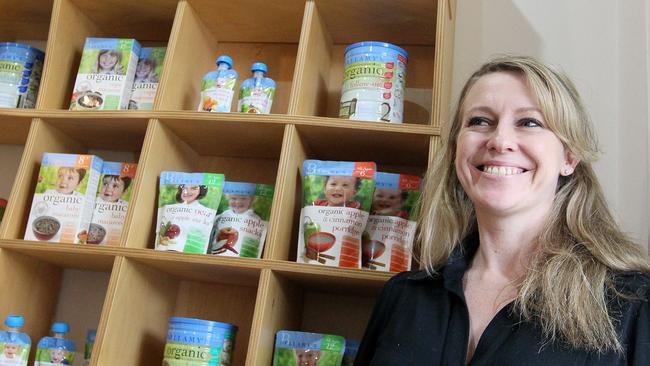Former Bellamy’s chief executive Laura McBain’s fall from glory
LAURA McBain was a pioneer of the baby formula boom, making Bellamy’s a $1 billion company — then it all came crashing down.

SHE’S the former accountant who transformed a struggling family business into a global baby formula giant.
Laura McBain built Bellamy’s Australia into a $1 billion company, as one of the first to capitalise on Chinese demand for its “clean and green” product in what has been dubbed a “white gold” boom.
But the former Telstra Businesswoman of the Year this week fell spectacularly from grace after a share market bloodbath wiped more than $770 million from the company’s value.
Ms McBain resigned as chief executive on Wednesday, as Bellamy’s share price continued its grim descent with its lengthy trading halt finally lifted.
Now the company’s future hangs in the balance as analysts warn that more falls could be on the way, potentially leaving the company exposed to a hostile takeover.
So how did it all go so wrong?
FROM TASMANIA TO THE WORLD
When she first joined Bellamy’s in 2004, Ms McBain was a young mum enjoying the slower pace of Launceston.
On secondment from her accounting firm, she soon got swept up in the excitement of the business and the potential of its unique organic brand, putting in long hours in what she has previously described as a “pressure cooker” environment.
When the company was taken over by Tasmanian Pure Foods in 2007, Ms McBain — who had since returned to her accounting firm — was hired as general manager.
Worried that Bellamy’s was too reliant on the whims of Coles and Woolworths, a concern that would prove ironic in developments to come, she looked to China as an opportunity to grow the business and expand its customer base.
“We understood there were only 200,000 babies born in Australia every year, compared to 20 million in China,” said Ms McBain told Public Accountant, adding that her decision was based on “gut instinct and feel”.
“I would like to see Bellamy’s achieve world domination, and then I will worry about what happens next,” she said.
It was a move that paid dividends — at first.
As one of the preferred brands of the Chinese personal shoppers known as daigou, Bellamy’s products flew off the shelves and its share price soared.
The company’s successful July 2014 IPO, which saw its shares jump from $1 to $1.30 in the first day of trading, was followed by a golden era in which its share price climbed steadily to a high of $15.48 in December 2015.
But things were about to get messy.
SHARE MARKET MELTDOWN
After a period of uncertainty about the Chinese market, with a government crackdown on imports making investors nervous, Bellamy’s shares took a dramatic plunge on December 2 last year when the company admitted its profit guidelines had been too optimistic.
Its shares were placed in a trading halt after falling from $12.30 to $6.50 in a single day, wiping half a billion dollars from the company’s worth.
When the trading halt was finally lifted on January 11, Ms McBain stood down as chief executive leaving the company in the hands of chief operating officer Andrew Cohen — a former management consultant regarded as better placed to handle the financial mess.
One of the first points of scrutiny faced by Ms McBain was the fact that she sold $2.4 million of her own shares in the company on August 26, while chairman Rob Woolley offloaded $2.9 million.
The timing of the sell-off, when the share price was still at a reasonably high $14.60, has left investors furious at what they see as a lack of transparency.
Several class actions are being prepared against the company for failing to issue a market update despite allegedly having figures that showed its domestic sales had fallen drastically.
Confidential supermarket and pharmacy sales data revealed that Bellamy’s domestic market share had fallen from 25 per cent in April to just 12 per cent by October, according to a Fairfax media report.
Meanwhile, a group of dissident shareholders led by Kathmandu founder Jan Cameron — a loyal supporter of Ms McBain — has been plotting a board coup, accusing the other directors of using the chief executive as a “scapegoat”.
SUPPLY CHAIN TROUBLES
While Bellamy’s woes can be partly blamed on the Chinese government’s tightening of import regulations in October, its rivals have managed to come out relatively unscathed.
Sales in China were hit by a change in brand preference by fickle daigou, who began to snap up the cheaper products hitting the market as other producers dumped stock ahead of the regulatory changes.
What brought the company undone appears to be the fact that it did not properly prepare for this risk.
Ms McBain has been criticised for channelling too large a proportion of sales through the daigou channel, and made the crucial mistake of entering long-term contracts for the supply of ingredients used to make its products.
Now the company has been forced to renegotiate its supply contract with New Zealand dairy giant Fonterra on less than favourable terms, giving it more time to revive sales.
It is now near impossible to predict what will happen to the company that was once a share market darling, with analysts warning that any turnaround under new management will require careful stewardship over a period of time.




